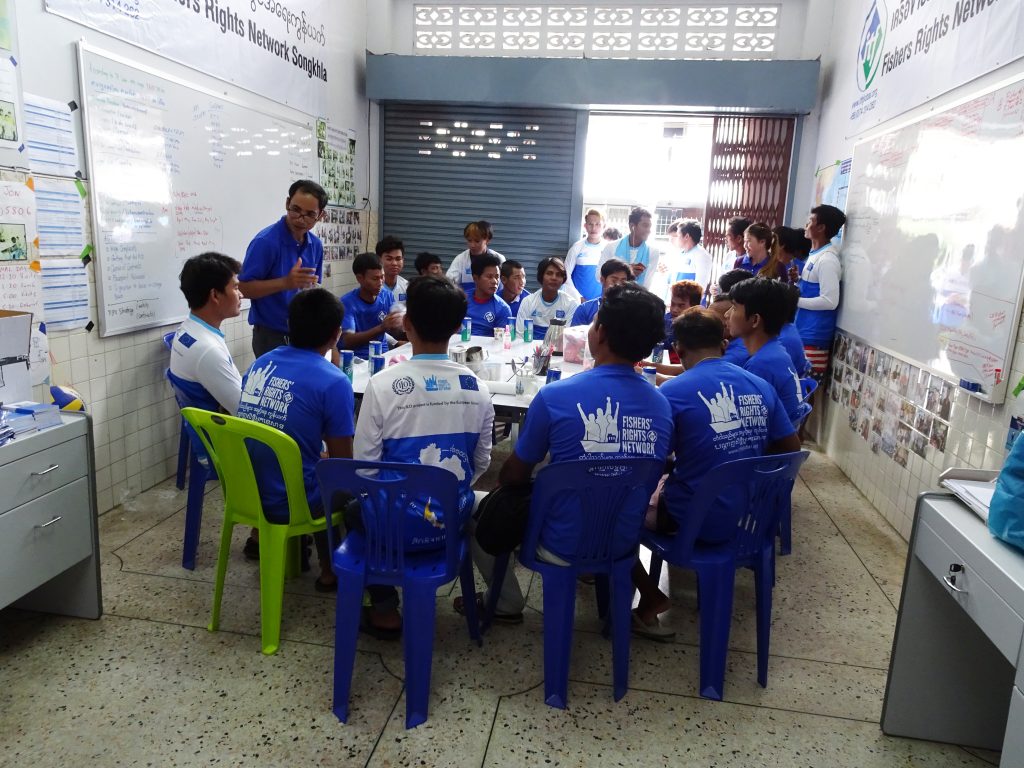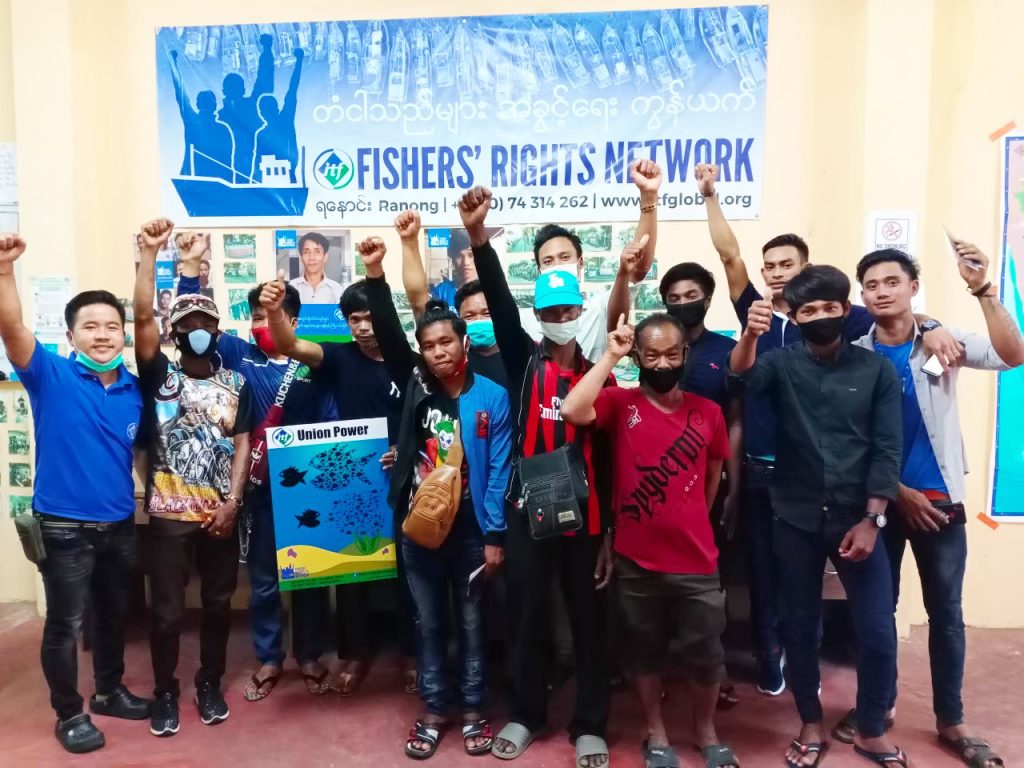Thailand / Labour Rights
A Level Playing Field
Fishers in Thailand have formed the Fishers Rights Network to collectively demand better wages and working conditions to prevent labour and human-rights abuses
This article is by Jon Hartough (hartough_jon@itf.org.uk), Thailand Project Lead of the International Transport Workers’ Federation (ITF) Fishers Rights Network(FRN)
Despite international pressure and government efforts to revise policy, Burmese and Cambodian migrant fishers in Thailand’s seafood industry still face significant labour-rights abuses. While there have been some positive steps taken to improve conditions in the Thai fishing industry, such as Thailand’s Draft Fisheries Act and the ratification of International Labour Organization (ILO) Work in Fishing Convention (C188), migrant fishers still face severe exploitation. Thailand ratified C188 in 2019, but effective implementation and enforcement remain major challenges to realizing structural reform that mitigates the significant problems remaining in the industry, both in Thailand and throughout the region.
… fishers are now recognizing they have the ability to reshape the industry and improve their future, if they organize to build power.
Among the problems still facing migrant fishers in the Thai fishing industry are:
Poor health and safety conditions: Conditions on board vessels remain substandard. Fishers regularly report inadequate food and clean drinking water, poorly stocked and inaccessible first-aid kits, insufficient protective equipment, poor training, cramped sleeping quarters, the absence of toilets, and limited hours of rest that increase injuries and accidents on board vessels.
Financial exploitation: Many fishers report receiving wages significantly lower than the amount stated in their employment contracts, and, in most cases, wages are paid in cash rather than as monthly bank transfers as required by Thai law. Fishers continue to remain at high risk of debt bondage due to unlawful migration and high broker or document fees.
Document retention and movement restrictions: Fishers report that their passports, work permits, automated teller machine (ATM) cards, bank passbooks, and other important documents are often held by the boat captain or owner, and are not accessible. This restricts the movement of fishers and limits their ability to change vessels, access payments, freely transfer or remit earnings, and report abuse.
Ineffective implementation and enforcement of ILO C188: Despite ratification, significant gaps remain in the effective implementation and enforcement of C188. Thai law and labour inspections currently do not meet the standards outlined in the Convention.
However, despite these problems, fishers are now recognizing they have the ability to reshape the industry and improve their future, if they organize to build power. The International Transport Workers’ Federation (ITF) has been assisting fishers in forming the Fishers Rights Network (FRN), the first and only independent and democratic trade union for migrant fishers in Thailand. Since its inception in 2018, the FRN has established organizing centres in three major Thai fishing ports, and organized over 3,000 migrant fishers. The main organizing centres are in Songkhla (in the ‘Deep South’), Ranong (on the Andaman Sea coast along the Myanmar border), and in Trat (eastern Thailand on the Cambodian border). These strategic locations have allowed the FRN to organize fishers as they enter the country and while they work on board fishing vessels.

Some of FRN’s daily organizing activities include small group meetings, health and safety training for fishers, and observing government Port In/Port Out (PIPO) inspections to help ensure that labour-rights protections for fishers are enforced. FRN fisher leaders have also co-ordinated across seaports nationwide to campaign for greater labour rights at sea, recognizing strength in solidarity as the driving force to sustainably change working conditions in the industry.
FRN campaigns have played a vital role in pressuring the Thai government to ratify ILO C188 and have influenced other pieces of important legislation and policy. FRN’s work was also a factor in the recent downgrading of Thailand on the United States Trafficking in Persons (TIP) report. In addition, FRN has worked with key allies to negotiate supply-chain agreements with large seafood corporations, such as Thai Union, the largest tuna company in the world. The Vessel Code of Conduct with Thai Union covers several provisions of employment and working conditions, including health and safety, wages and payment provisions, equality/fair treatment, and freedom of association.
In June, FRN leaders called on the Thai Government to enforce employment contract provisions after conducting a three-month survey of 520 fishers in eight provinces. The research revealed that 87 per cent of fishers do not possess a copy of their employment contract, 96 per cent do not completely understand their contract, and 89 per cent have not had their contract translated or explained in a language they can understand.
The fishers have issued three demands to the government regarding their employment contracts: (1) Effectively enforce the ILO Work in Fishing Convention (C188) and ensure that all fishers have a copy of their employment contract in their own language; (2) Ensure that all PIPO centres allow fishers to review and verify the contract presented by their employer at inspection, and report violations in a safe and protected space; and (3) Support Thai agencies to enforce employment contract provisions and protect all fishers’ rights, including those of migrant fishers.

Beyond national-level campaigning, FRN members have taken collective action at the vessel level. Earlier this year, 11 Burmese FRN members won nearly USD 5,000 in back pay after their Thai employer tried to cheat them out of their full pay. The fishers had worked for more than six months without payment. Acting on a complaint filed by the union, the Ranong Department of Labour Protection and Welfare ordered the employer to fully compensate the fishers.
For far too long, Burmese and Khmer migrant fishers have worked for owners who break the law and continue to make huge profits in the global seafood market from their labour. Until now, fishers have not fought hard to protect their rights, but as FRN members begin to fight back and win landmark cases such as the abovementioned one, there is a sense that the tide may be turning across the industry. This victory proves that fishers can stop corrupt owners from cheating them.
FRN fishers have overcome significant obstacles faced by migrant workers in their struggle towards organizing and collective bargaining rights. Currently Thai labour law does not meet international labour standards, and restricts migrant workers from legally forming their own union and collectively bargaining with their employer (as per ILO Conventions 87 and 98, which Thailand has not ratified). Without the fundamental right to organize (protected by law), migrant workers remain vulnerable to labour exploitation and risk employer retribution, unfair penalties, and termination if they collectively organize and demand better wages and working conditions.
By building the FRN, migrant fishers have been organizing to build power to prevent labour and human-rights abuses in Thailand, and to level the playing field with employers to negotiate fair employment contracts with decent wages, benefits and safe working conditions. Significant legal reform is still needed in Thailand to protect migrant fishers. All workers, regardless of nationality, should be allowed to exercise their fundamental human rights, including the right to join or form a union.
A Fishers Assembly in Songkhla, Thailand, in May, 2018. Fishers have demanded that the ILO Work in Fishing Convention (C188) be enforced and that all fishers have a copy of their employment contract in their own language
A meeting of fishers in Ranong, Thailand, in January, 2020. Since its inception in 2018, the FRN has organized over 3,000 migrant fishers in three major Thai fishing ports
For more
Fishers Rights Network
https://justiceforfishers.org/
Thai Union Vessel Improvement Program and Code of Conduct
Trafficking in Persons Report – US Department of State
https://www.state.gov/wp-content/uploads/2021/07/TIP_Report_Final_20210701.pdf
ILO Endline research findings on fishers and seafood workers in Thailand
https://www.ilo.org/asia/publications/WCMS_738042/lang–en/index.htm